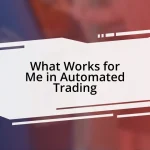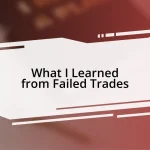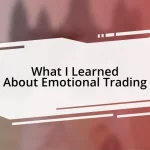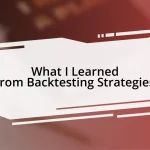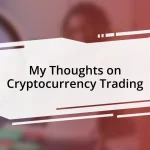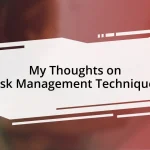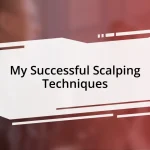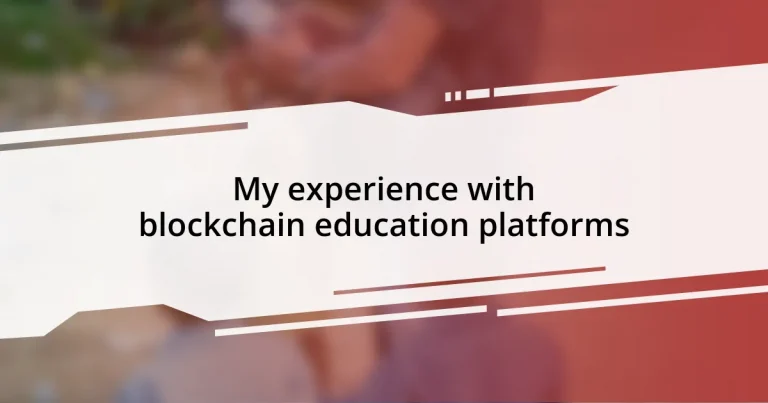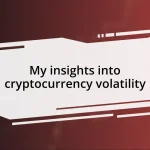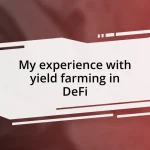Key takeaways:
- Blockchain technology enables secure and transparent transactions through a decentralized ledger, transforming trust dynamics across industries.
- Education in blockchain is crucial for empowerment, fostering innovation, creating career opportunities, and increasing security awareness.
- Diverse blockchain education platforms, from academic programs to community-driven initiatives, cater to various learning styles and preferences.
- Future blockchain education will likely integrate emerging technologies and promote collaborative learning to enhance understanding and problem-solving skills.
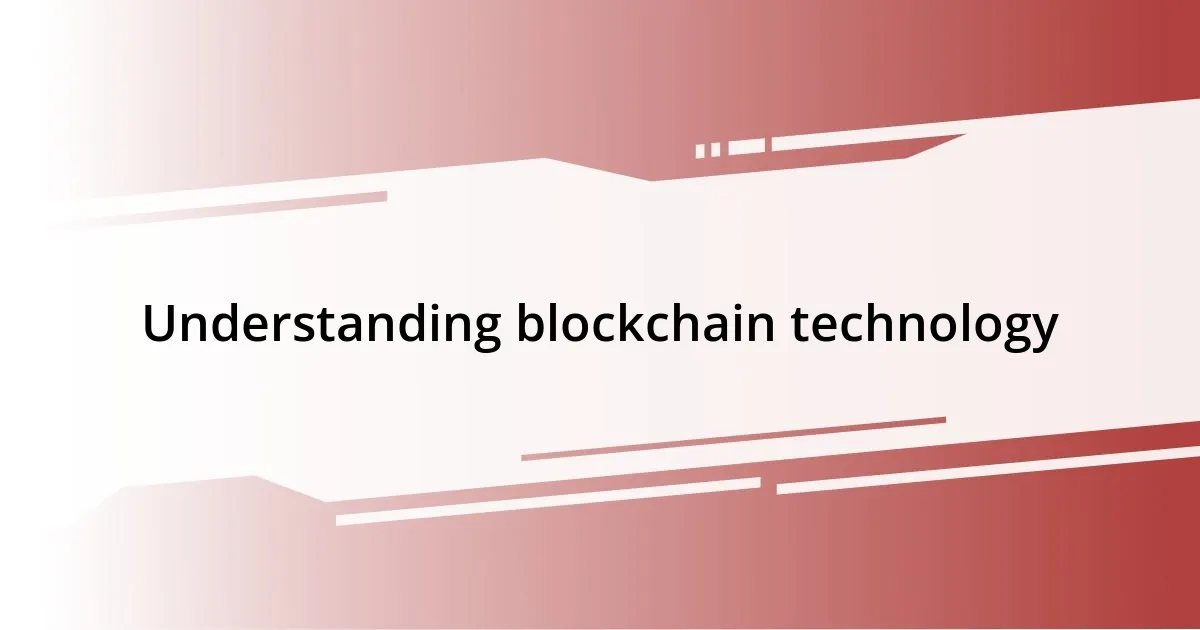
Understanding blockchain technology
Blockchain technology, at its core, is a decentralized ledger system that allows for secure and transparent transactions. When I first encountered this concept, I felt a mix of curiosity and skepticism. How could a technology enable trust without a central authority? Diving deeper, I realized that its appeal lies in its ability to create a tamper-proof record, which is revolutionary for industries that value integrity and provenance.
I still remember my first hands-on experience with a blockchain application during an online course. It was exhilarating to see how blocks of information were interlinked, almost like a digital chain that represented a history of transactions. Watching how minor changes to one block affected the entire chain made it clear why blockchain is often compared to a digital fortress – it truly protects data in a way that traditional systems struggle to achieve.
Moreover, the idea of smart contracts captivated me. These self-executing contracts with the terms directly written into code can automate processes and eliminate intermediaries. Imagine the possibilities! The very thought of conducting transactions without the need for middlemen struck me as liberating, but it also raised questions on legal and ethical implications. This combination of potential and uncertainty added layers to my understanding of blockchain technology, transforming it not just into a technical concept, but a living, breathing entity that is reshaping our digital landscape.
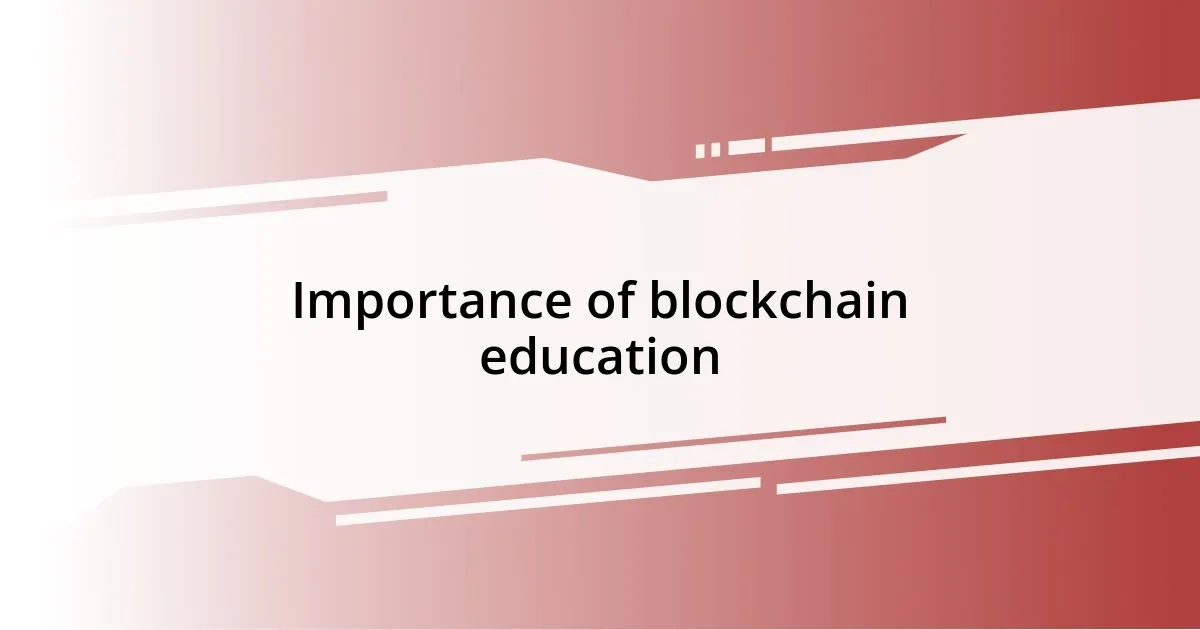
Importance of blockchain education
The importance of blockchain education cannot be overstated. My journey through various courses made it clear that understanding this technology is foundational, especially as it’s being adopted across industries. For me, grasping the complexities of blockchain enabled me to engage in conversations about its implications confidently. As I learned about its potential to disrupt traditional systems, I found myself excited about new career opportunities emerging in this space.
Here are a few key reasons why blockchain education is essential:
- Empowerment: Knowledge equips individuals to harness blockchain for personal and professional growth.
- Innovation: Understanding blockchain fosters creativity, allowing learners to innovate solutions that address real-world problems.
- Trust: A solid grasp of blockchain technology helps build credibility, especially when discussing its applications with peers or stakeholders.
- Career Opportunities: As more organizations seek blockchain expertise, education creates a pathway to lucrative job prospects.
- Security Awareness: Education offers insights into the risks and challenges associated with blockchain, enabling informed decision-making.
Reflecting on my own experience, each class or seminar felt like peeling back layers of complexity. I remember a particularly engaging workshop where participants collaborated to create a decentralized application. The thrill of building something tangible sparked a realization: understanding blockchain is not just a job skill; it’s a gateway to being part of a much larger innovation narrative.
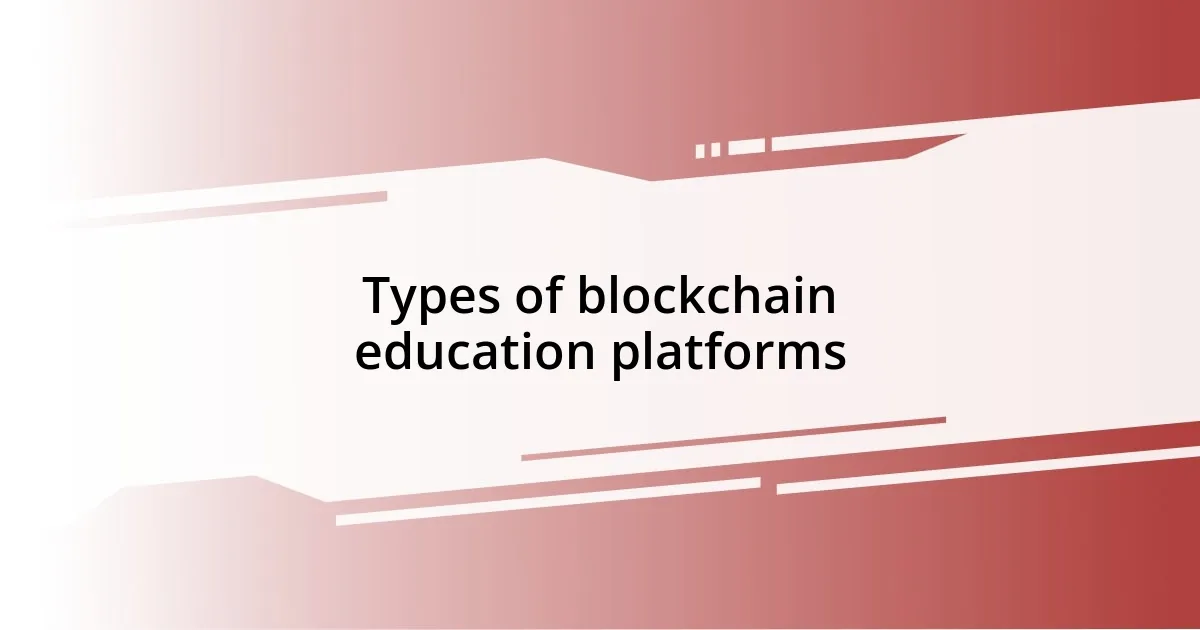
Types of blockchain education platforms
The landscape of blockchain education platforms is diverse, catering to different learning preferences and goals. Some platforms are heavily centered on academic rigor. For instance, universities and institutions offer formal degree programs that dive deep into the technical and theoretical underpinnings of blockchain. I recall my initial hesitation about enrolling in such programs, wondering if they would truly provide practical skills. However, the structured environment and expert faculty made a world of difference, transforming theoretical knowledge into real-world applications.
On the other hand, self-paced online courses have become increasingly popular, particularly among professionals looking to upskill quickly. I personally benefited from platforms that offered bite-sized modules I could complete at my own pace. It felt empowering to carve out my own learning journey, but I had to be disciplined. At times, I would struggle with procrastination, yet the flexibility allowed me to revisit topics as needed, deepening my understanding in a way that traditional settings sometimes don’t.
Moreover, interactive and community-driven platforms stand out for those who thrive in collaborative environments. These often include forums or group projects, which can be invaluable for networking and sharing perspectives. I once participated in a community-led project, and it was mind-blowing to see how a diverse group of thinkers could solve a complex problem together. The camaraderie and exchange of ideas not only enhanced my technical skills but also fostered lasting relationships.
| Type of Platform | Description |
|---|---|
| Academic Programs | Formal courses offered by universities or institutions that focus on in-depth blockchain theory and practice. |
| Online Courses | Self-paced learning platforms providing flexible modules for professionals to upskill quickly. |
| Community-driven Platforms | Collaborative spaces where learners engage in projects and discussions, promoting networking and knowledge-sharing. |
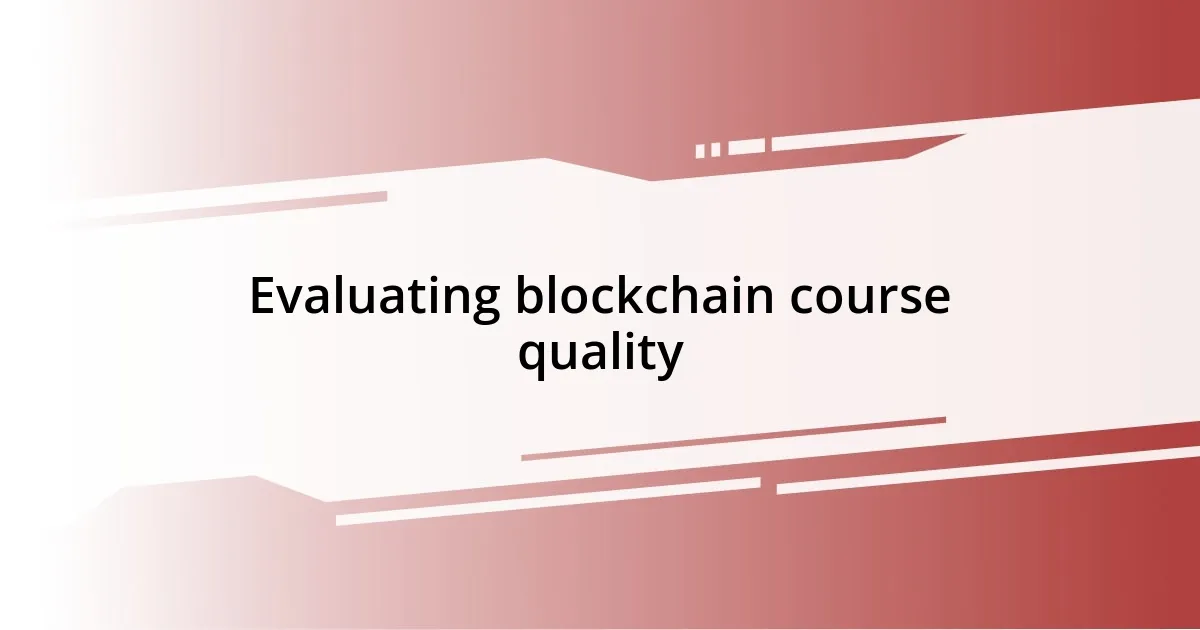
Evaluating blockchain course quality
Evaluating the quality of a blockchain course can feel daunting, but I’ve learned to look for certain key indicators. For starters, I often assess the course content depth. I recall a course that highlighted various blockchain applications, but the absence of practical case studies left me wanting more. Real-world examples make concepts stick, don’t you think?
Instructor expertise is another critical element I consider. I once enrolled in a class taught by an industry leader who shared personal experiences from their work in blockchain development. This made the lessons feel more authentic and relatable. A well-informed instructor can make complex materials digestible, opening up a whole new understanding of a technology that can seem intimidating at first.
Finally, peer interaction can greatly enhance the learning experience. I remember participating in an online discussion forum where learners could ask questions and share insights. The diverse viewpoints were enlightening and motivated me to think beyond the surface. Isn’t it fascinating how a robust community can elevate your learning journey? When evaluating a course, it’s essential to consider whether it fosters such collaborative spaces.
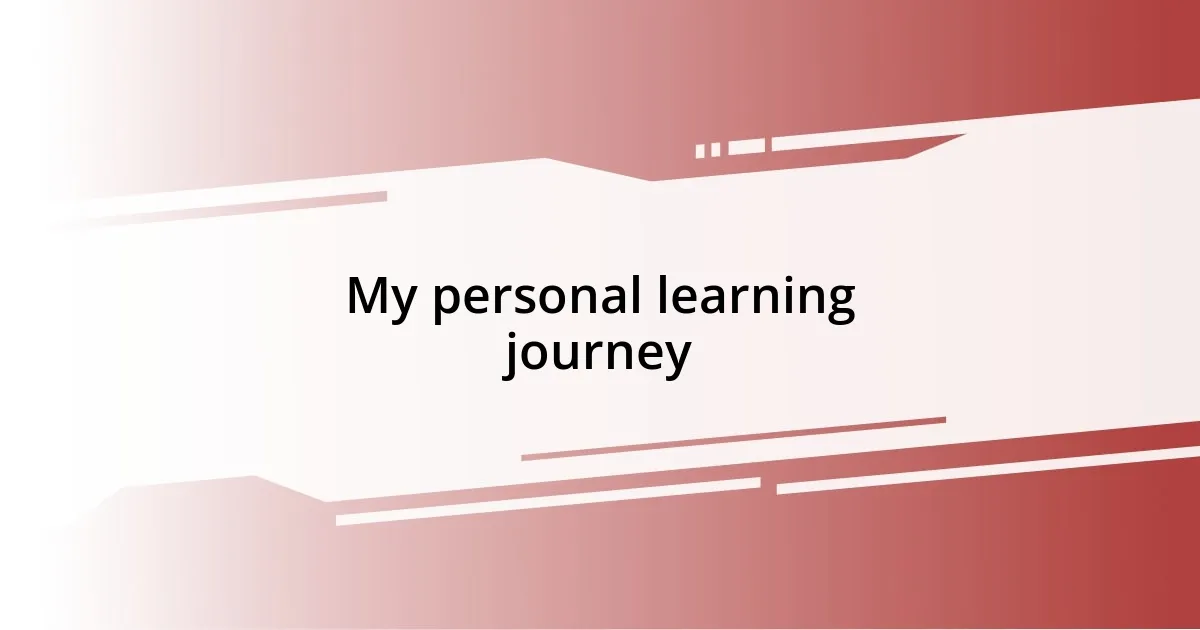
My personal learning journey
My journey through blockchain education has been filled with unexpected turns. When I first dipped my toes into the world of blockchain, I was overwhelmed by the jargon and complex concepts. I remember sitting in my first online class, feeling a mix of excitement and anxiety as the instructor began breaking down cryptographic principles. The moment those concepts started to click was exhilarating; it felt like I was unlocking a new skill set that would change my professional trajectory.
One particularly transformative experience was when I attended a blockchain hackathon. Surrounded by passionate individuals, I felt an electric atmosphere of collaboration. I had always appreciated learning in a structured way, but nothing prepared me for the hands-on impact of working on a real project with others. As we brainstormed solutions, my perspective broadened, and I realized that understanding blockchain goes beyond theoretical knowledge—it’s about applying that understanding in a practical, tangible way.
Reflecting on my learning path, I sometimes wonder how drastically my approach could have shifted without those immersive experiences. I used to think I could rely solely on textbooks and lectures to grasp complex topics. Now I know that engaging with a community, looking for those moments of connection, and diving into hands-on projects are what truly solidify knowledge. Isn’t it amazing how interaction can deepen your understanding in ways that solitary study often cannot?
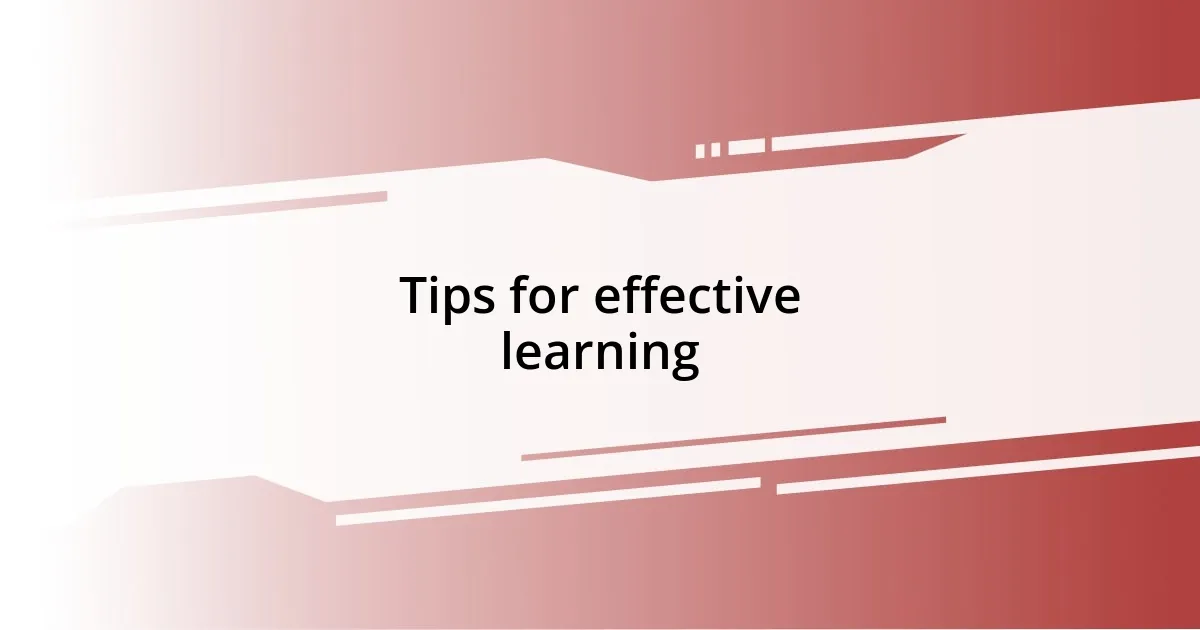
Tips for effective learning
To maximize your learning experience, I suggest setting clear goals. In my own journey, I often found that defining what I wanted to achieve—be it mastering a specific concept or completing a project—kept me motivated. Have you ever noticed how focusing on your goals can transform your approach? It makes learning more purposeful and exciting!
I also recommend creating a study schedule. There were weeks when my blockchain coursework piled up, and I felt overwhelmed. By carving out dedicated time, I learned to juggle my studies more effectively, balancing short bursts of intense focus with breaks to reflect. Can you imagine how much easier it is to absorb information when you have a clear plan?
Lastly, don’t hesitate to ask for help or clarification. I remember a moment in a group project when I felt lost, yet sharing my confusion with teammates revealed just how many others felt the same way. Engaging in open dialogue can turn stumbling blocks into stepping stones. Isn’t it reassuring to know that seeking assistance often leads to deeper understanding?
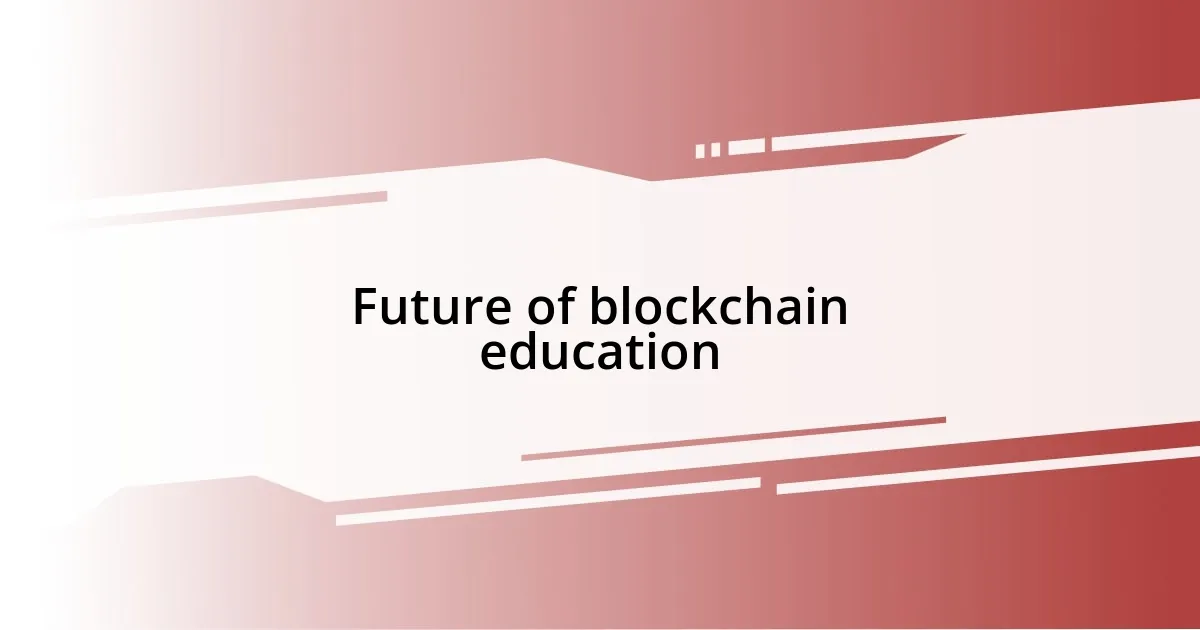
Future of blockchain education
As I look ahead, the future of blockchain education appears promising, especially with the rise of tailored online platforms. I remember when I stumbled upon a specialized course that not only matched my learning style but also incorporated interactive elements, such as quizzes and real-time discussions. It transformed my understanding and made the content feel alive. Could personalized learning pathways be the key to making blockchain concepts accessible to everyone?
Emerging technologies are bound to play a pivotal role in shaping how we learn about blockchain. Imagine using virtual reality to walk through a blockchain network as if you’re navigating a digital city. When I first tried gamified learning, it made complex ideas feel more digestible and fun. Isn’t it fascinating how blending technology and education could revolutionize our comprehension of something as intricate as blockchain?
The collaborative nature of future blockchain education is what excites me most. I envision communities forming around shared interests, creating spaces where learners can connect, share insights, and work together on projects. Just think about the possibilities: I recently participated in a global online workshop where we solved real-world blockchain challenges. Those connections had such a profound impact on my learning; don’t you think that collaboration could be the catalyst for innovation in this field?
